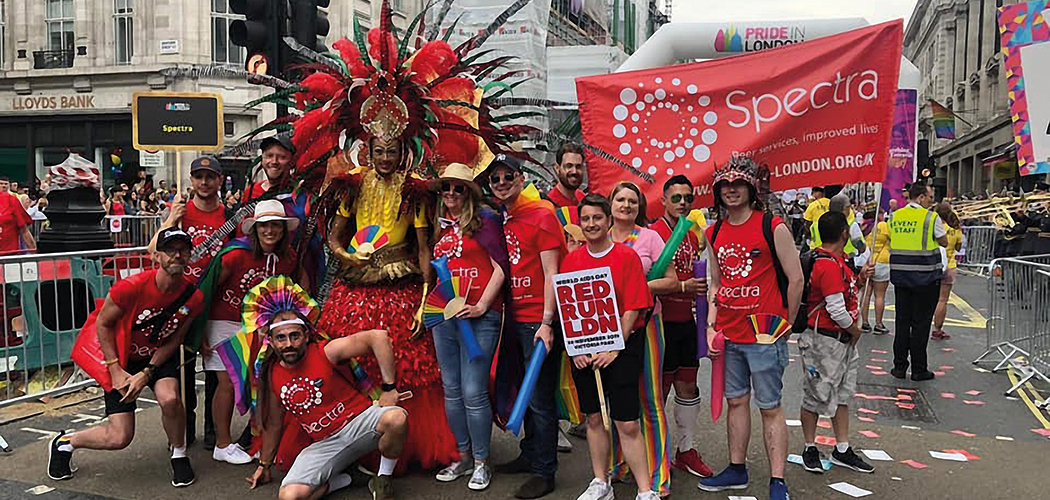David Hudson reports on how the West London organisation Spectra helped one non-binary person – and their short film #WhoIsAlex which tells more – and services it offers others on the trans spectrum.

With trans people often having to wait a prolonged amount of time before securing support through the NHS, the work of non-profits and charities becomes ever more important.
One such organisation is Spectra, based in West London. The organisation, running since the early 1990s, was formerly known as the West London Gay Men’s Project. It was set up when the AIDS crisis was at its peak.
Thanks to the introduction of effective medication to reduce HIV transmission rates and change the lives of those living with the virus, the organisation has evolved. It now serves a wider remit.
Its support for trans people was highlighted recently in a short film it helped produce with director James Webber. #WhoIsAlex is told through the words of a non-binary person who has used Spectra’s services. Non-binary can cover a spectrum of genders that are neither exclusively male or female. Many regard it as falling under the umbrella as trans identities as non-binary people identify as a gender different from the one they were assigned at birth.
Alex tells Boyz they’ve always known they were non-binary but it’s only in the last few years that they have found the words to express it. Support from Spectra has helped enormously. The organisation offers counselling, peer mentoring, monthly social groups for trans people, sexual health advice and even a trans podcast.
Serana Hicks, Spectra’s Trans Programme Manager, says its services have been created in response to service users’ needs.
Among the common challenges trans people face, Serana highlights, “isolation, transphobia, and dealing with family issues. A lot of people present with substance misuse issues, as a result of navigating through this treacle of phobia which often leads to some kinds of mental health problems. Employment is another issue that a lot of trans people are struggling with.”
No two people’s experiences will be the same. As Alex says in the film, one of their biggest challenges was around becoming a parent. Being seen as a “mother” comes with a lot of societal pressure.
Alex says they got in touch with Spectra three years ago. The organisation was “hugely important” in helping them navigate their journey.
“Up to that point I’d never spoken to anybody. It was the first time in my life that I talked with someone who knew exactly what I was talking about without going through a huge explanation.”
John Dugdale, Spectra’s Operations Manager believes Spectra’s trans groups are “vitally important … [They] provide safe spaces for people who are at different points in their particular journey, and to meet others who have been on that journey. They can also receive signposting to other agencies that they might find helpful, like [sexual health and well-being service] ClinicQ. It’s somewhere safe for people to go.”
Spectra has seen an increase in the demand for its trans services.
“We are seeing a certain spike in the number of people who are applying to be trans mentors or looking to be mentees who are non-binary,” adds Serana. “I think this is an offshoot of the fact people are struggling with gaining access to NHS services.”
Serana detects a real “consciousness shift” with respect to trans issues, helped by celebrities such as actor Indya Moore (Pose) and Sam Smith revealing themselves to be non-binary. The singer recently said, “I’m not male or female, I think I flow somewhere in between.” Increasingly, people have “become awoke to the fact gender isn’t necessarily rigid, or gender isn’t necessarily something that people want to subscribe to,” says Serana.
Of course, there’s also been an increase in coverage of trans issues in the mainstream press. Not all of it understanding or supportive.
Serana believes this can “negatively impact on the perception people have, or they question themselves when it comes to transition: they think they’re not ‘trans enough’, or they unsure of the idea of what it means to be non-binary.”
It’s why Spectra’s peer-led support is such an important antidote. Alex says they do their best to ignore the coverage of trans issues in some parts of the press.
“I simply ignore it. I don’t look at stuff on Twitter and made a decision not to read that sort of press. I try to avoid that and just try to educate people whenever I can. A lot of that is born out of ignorance and it’s basically because people don’t understand it.”
If you’re struggling with exploring your gender identity, Alex advises you try to, “talk to somebody you can trust. It’s really important to find somebody who understands what you’re talking about, it makes a huge difference.” Of course, that might not be someone in your immediate support network, but an organisation like Spectra.
“Try to be yourself because there are huge costs to being in the closet,” says Alex. “There is quite a bit of support out there, and Spectra is a good place to start.”
#WhoIsAlex can be found on Spectra’s YouTube channel.
Spectra, St Charles Centre for Health and Wellbeing, Exmoor Street, London W10 6DZ. spectra-london.org.uk














